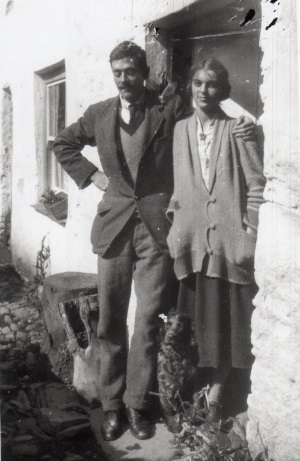
| Home |
Endorsements |
About the
Exhibition |
Saki |
Colonel and Sarah Hibbert |
F R Lee |
Benjamin Manning |
Timeline |
 |
Henry Williamson
|
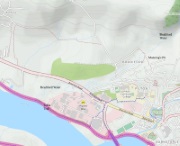 |
North Devon is Tarka country. Henry Willliamson's book Tarka the Otter follows the life and journey of a male otter around the coast and rivers of North Devon. Nearly 90 years after the book was published, you can't go far in this area without coming upon a reference to Tarka. Bradiford Water, the small river that runs through Manning's Pit, goes under the Tarka Trail on its journey down to the Taw estaury (see adapted OpenStreetMap on left.) |
| During his
research for the book, Henry Williamson walked up and
down all the streams and rivers that could have been
part of Tarka's journey. So it was only natural that as
we looked for literary connections to Manning's Pit, we
wondered if he had come up along Bradiford Water. We
know that otters do, a few of us have actually seen
them, and more have seen their spreints and footprints
on the river banks of Manning's Pit. Here is a link to a video of an otter in Manning's Pit, posted on our Facebook Page by Mike Nagle |
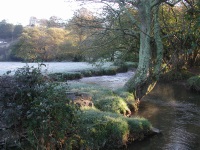 Bradiford Water, just beyond Manning's Pit |
| What we
didn't know, when we began our research - because we are
only members of a campaign group, not historians or
experts - was that there was a genuine link between
Henry Williamson and the people who lived close to
Manning's Pit, through his first marriage, to Hugh and
Sarah Catherine Hibbert's grandaughter, Ida Loetitia
Hibbert. Ida's mother, Margaret Dora, was one of
Sarah Catherine and Hugh's children, and she married her
cousin Charles against family opposition. She had grown
up in Broadgate House, and would have walked to Church
on Sundays with her parents, seeing the Munro family,
and young Hector, and even Benjamin Manning. Henry Williamson met both Charles and Ida Loetitia while doing research for "Tarka The Otter". Charles and Ida Loetitia both feature as characters in the book, and it is Ida Loetitia, the girl on a bridge, who spots Tarka in the river but does not give his presence away to the hunt. They married in 1925, and when Tarka The Otter was published (in 1927) it won the Hawthorden Prize and remains one of the great books of the 20th Century. You can find extensive details about Henry, his books and his life on the very informative and interesting Henry Williamson Society website. There are four books that deserve special mention though, here, from the Manning's Pit perspective. |
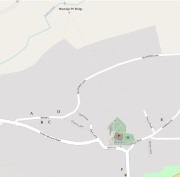 |
The
first book is
"The Village Book", as it contains a dedication to
"Grannie" Hibbert. Henry Williamson was very fond of Sarah Hibbert, who had been kind to him and his wife. She was in poor health at the time "The Village Book" book was published and died soon after. The adapted OpenStreetMap map linked to on the left shows the location of the Cottage where Mrs Hibbert lived between 1919 and her death in 1931. |
| Richard
Williamson, Henry Williamson's son, and his wife Anne,
have signed our petition, and they made this Comment: "As descendants of the Hibbert family of
Broadgate – and Henry Williamson’s own family -
and ourselves actively involved in nature
conservation, we feel that this very important
area should be left wild as an important lung for
nature and for people to enjoy. While
appreciating that there is a need for development
for housing – it is also extremely important that
animals have a refuge and people a place for the
mind and spirit.
This area was of importance to the Hibberts and to Henry Williamson, who would have walked there when he visited ‘Grannie’ – Mrs. Sarah Hibbert – who was very gracious and kindly encouraging to him when he was writing Tarka the Otter. Her daughter, Margaret Dora, married her cousin Charles Hibbert. I am sure that as a child Margaret Hibbert and her brothers and sisters played with the young ‘Saki’ who would also have wandered the area." |
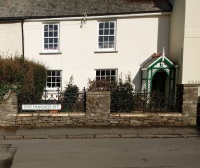
|
|
| The Second and Third Books
of interest are "On Foot in Devon" by Henry Williamson,
and "Following in Henry Williamson's Footsteps," by his
daughter in law, Anne Williamson. Anne is married to
Henry's son Richard. Both books are well worth
reading to anyone who loves the North Devon Coast. "On Foot in Devon" describes walks from Lynton in the North, around by Croyde and Braunton, and back along the Estuary to Barnstaple. It is while discussing the latter part of the walk, along the estuary near Ashford and Pilton, that Henry Williamson mentions Saki. In the e-book, "Following Henry Williamson's Footsteps," Anne Williamson, says, discussing the remarks Williamson made about Saki: "By an extraordinary coincidence, Broadgate Villa was opposite Broadgate house where lived Col. Hugh Robert and and Augusta Hibbert, the parents of HW's wife's mother, and indeed the villa was part of their estate. They would have known each other well. Hibbert children may well have been one of the few families with which the Munro children were allowed to associate." The third book of special interest to Manning's Pit is "Salar the Salmon" We cannot yet prove that Williamson visited the river at Manning's Pit while researching this book, but it is very possible that he did so at some time, whether to research or simply to fish. Salmon are known to come up Bradiford Water - maybe not so many in recent years, but that is all the more reason why this river should be protected. Further up from Manning's Pit, in Tutshill Woods, there is a weir said to have been built as a fish ladder. The final book to mention is Henry Williamson: Tarka and the Last Romantic, a biography of Henry Williamson, by Anne Williamson, which draws on the primary source material from Williamson's own archive, including his diaries, journals and papers, and family memories. In this book, Anne mentions the special deluxe limited edition of Tarka The Otter (100 copies, printed in full vellum) and bought by Walter de la Mere, John Galsworthy and among others: ""Grannie", Sarah Catherine Augusta Hibbert, with whom Henry had a very close rapport." Anne Williamson also mentions that after receiving the letter which informed him he had won the Hawthornden Prize, telling him to keep it a profound secret, he straight away wrote to "Grannie" enclosing the very letter. Anne writes" She appears to have been unfailingly gracious to him and her experience as an artis's daughter and well travelled woman no doubt gave Henry a sense of empathy. Her letter were always kind and encouraging and would have been very soothing to Henry." |
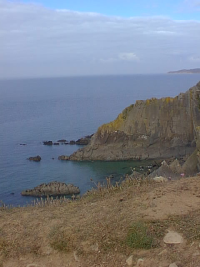 Baggy Point, North Devon Coast 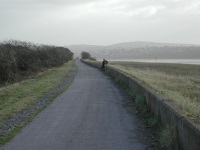 The Tarka Trail, between Ashford and Pottington 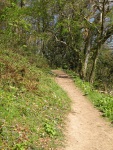 In Tutshill Woods, near fish ladder  "Grannie" Hibbert |
| This page is not yet complete, more to be
added here. Some links that demonstrate the importance of Tarka to the North Devon Tourist Industry: : https://www.theguardian.com/travel/2017/mar/25/tarka-the-otter-trail-north-devon-wildlife-henry-williamson http://www.independent.co.uk/travel/uk/north-devon-you-can-still-spot-an-otter-on-tarkas-trail-396869.html |